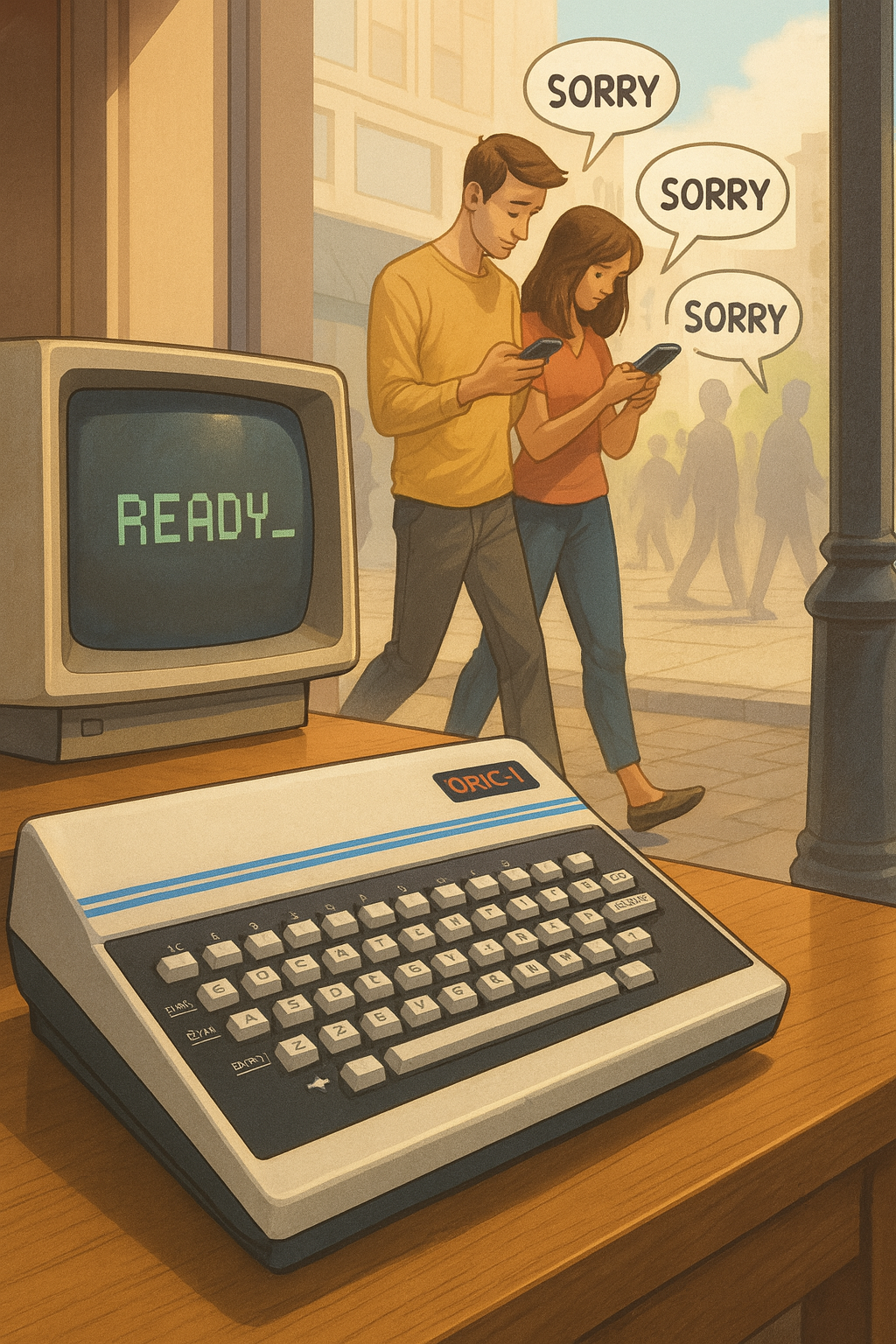From Rainbow Cassettes to Quantum Algorithms: Technology as a Mirror, Not a Master

Introduction
Remember the thrill of sliding a glossy white rainbow‑labelled data cassette into a Commodore Vic‑20, or the Oric-1 seen above and waiting for the blinking cursor to burst into colour?
That humble 8-bit machine, today's bright light bulb more powerful than it, sparked the imagination of an entire generation and launched countless journeys into technology.
Four and a half decades later, rumours swirl that the famous Commodore badge may yet return, poised to ride a fresh wave of nostalgia‑fuelled innovation.
Back then, computers introduced themselves politely—"READY."—and waited for a human command.

Now algorithms anticipate every click, every hunger pang, every half‑formed desire.
Progress is undeniable. Yet a sharper question presses: If technology delivers limitless convenience but erodes the capacity for presence, what has truly been gained?
Scene One: Star Trek Futures, Pocket‑Sized Now
Despite living in an era that once belonged only to Star Trek episodes and films, crowds still drift down high streets, eyes fixed on palm‑sized "communicators" more powerful than the Enterprise's mainframe.
Occasionally, two walkers collide, mutter an automatic "sorry," and proceed—detached from each other and the reality around them.
The apology, like the brief smile often accompanying it, has become a reflex, almost devoid of meaning.
What if, instead, those empty words were replaced by genuine encounters—a moment to greet, to laugh, to look? Would pavements feel friendlier, and might isolation shrink even in a crowd?
Scene Two: Betamax, VHS, and the Lesson of Ephemeral Victories
Video enthusiasts of the 1980s may recall a spirited skirmish: Betamax versus VHS.
Betamax boasted sharper pictures, yet VHS claimed the living room through more extended playtime and savvy licensing.
In the arcade, Atari once reigned supreme—until Commodore's Amiga dazzled creatives with multitasking music and graphics.
Each battle crowned a temporary victor, but every champion eventually yielded to the next breakthrough.
Which of today's "must‑have" platforms will seem quaint in ten short years, and what will remain of the human stories told upon them?
Scene Three: Digital Gates and Paperless Fences
Step into many local shops, and the welcome desk is now a screen.
Parking "validation" requires a QR scan at entry and another at departure; a forgotten tap summons a fine, delivered by algorithmic courier.
Processes sold as frictionless often manufacture new anxieties, reducing organic interaction to mechanised compliance.
Once, the "paperless office" promised freedom from clutter and waste.
Yet inboxes overflow, passwords multiply, and user agreements stretch longer than Victorian novels.
If every shortcut spawns three fresh tasks, can it still be called efficiency?
Scene Four: Authenticity in an Automated Age
Across professional networks, AI now autogenerates "insightful" posts, complete with immaculate grammar and trending hashtags.
Readers scroll past flawless paragraphs, yet something feels missing—the subtle crookedness that signals honest craft.
Within AKADATA LIMITED, teams harness formidable automation; yet, a guiding principle remains clear: innovation exists to serve humanity, never to supplant it.
Drafts emerging from an algorithm are stress‑tested, refined, questioned, and invited to prove their worth under human light.
Does a tool elevate creativity, or does it lull imagination into idle spectatorship?
Scene Five: Dawn Choirs and Quiet Screens
At sunrise, a single blackbird often out‑sings the chatter of notifications.
Its melody cannot be paused, liked, or retweeted; it simply is.
Consider the possibility that the most advanced deployment of technology is knowing when to lay it aside—when to look up, breathe, and let the unscripted world speak.
Conclusion: The Command Is Still "INPUT"
Over forty years ago, every Vic‑20 user learned an essential truth: nothing happened until a prompt appeared and fingers typed INPUT.
Despite exponentially faster processors and quantum aspirations, that truth remains.
Curiosity, empathy, restraint—human input—is the catalyst for progress that endures.
So pause the infinite scroll for a heartbeat.
Ask the vulnerable question.
Offer a sincere greeting instead of the perfunctory "sorry."
If Commodore does return, may its reborn computers remind this generation why technology first captivated the imagination: not for the glow of the screen, but for the doorway it opens to collaboration, creativity, and deeper understanding.

When the next notification buzzes, consider: Is attention being invested wisely, or is it merely being spent?
The answer will shape the legacy carried forward, cassette by cassette, byte by byte, into the decades yet to come.
